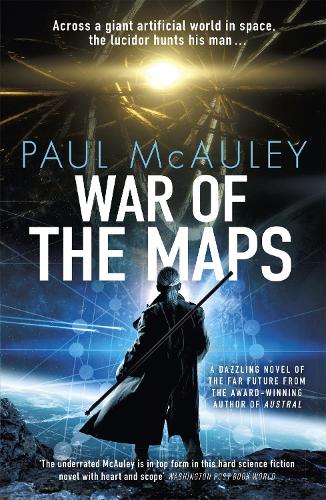
War of the Maps
(Paperback)
Publishing Details
War of the Maps
By (Author) Paul McAuley
Orion Publishing Co
Gollancz
27th April 2021
7th January 2021
United Kingdom
Classifications
General
Fiction
823.92
Physical Properties
Paperback
432
Width 126mm, Height 196mm, Spine 30mm
300g
Description
'The underrated McAuley is in top form in this hard science fiction novel with heart.' Washington Post Book World
On a giant artificial world surrounding an artificial sun, one man - a lucidor, a keeper of the peace, a policeman - is on the hunt. His target was responsible for an atrocity, but is too valuable to the government to be truly punished. Instead he has been sent to the frontlines of the war, to use his unique talents on the enemy. So the lucidor has ignored orders, deserted from his job, left his home and thrown his life away, in order to finally claim justice.Separated by massive seas, the various maps dotted on the surface of this world rarely contact each other. But something has begun to infiltrate the edges of the lucidor's map, something that genetically alters animals and plants and turns them into killers. Only the lucidor knows the depths to which his quarry will sink in order to survive, only the lucidor can capture him. The way is long and dangerous. The lucidor's government has set hunters after him. He has no friends, no resources, no plan.But he does have a mission.Reviews
A brilliantly constructed novel, a story that drew me in and took me along for the ride. I love the setting, want to know more about the lucidor's world and the people who live there. It's a book I'd definitely recommend * SFCrowsnest *
The spectacle is undeniable, but it's that rich cast of characters who give their world texture and resonance, and who finally turn War of the Maps into a fine, compelling novel. * Locus *
Following on from the extraordinary climate change novel Austral, this
is further evidence that Paul McAuley may just be the best SF writer we
have. 4.5 stars
As usual, McAuley imparts mind-bending SF concepts in prose that is always elegant and precise. * Crime Time *
McAuley is without peer. * The Times *
The underrated McAuley is in top form in this hard science fiction novel with heart * Washington Post Book World *
Narrative drive and a sense of wonder come together in McAuley's graceful prose * Guardian *
Author Bio
Paul McAuley (Born 1955)
Paul James McAuley was born in Gloucestershire on St George's Day, 1955. He has a Ph.D in Botany and worked as a researcher in biology at various universities, including Oxford and UCLA, and for six years was a lecturer in botany at St Andrews University, before leaving academia to write full time. He started publishing science fiction with the short story "Wagon, Passing" for Asimov's Science Fiction in 1984. His first novel, 400 Billion Stars won the Philip K. Dick Award in 1988, and 1995's Fairyland won the Arthur C. Clarke and John W. Campbell Awards. He has also won the British Fantasy, Sidewise and Theodore Sturgeon Awards. He lives in London.You can find his blog at: http://www.unlikelyworlds.blogspot.com